- Home
- Jude Hardin
Lady 52: A Jack Daniels/Nicholas Colt Novel
Lady 52: A Jack Daniels/Nicholas Colt Novel Read online
About LADY 52
What do Lt. Jacqueline “Jack” Daniels and private investigator Nicholas Colt have in common?
Billiards, bourbon, bad jokes…
And murder. Several, in fact.
A homeless woman’s remains are found near Chicago twenty-six years after she disappeared. Her daughter—now retired in Florida—suspects foul play, and she hires Colt to fly up there and check it out.
A prominent Chicago physician is slain outside a convenience store, horribly mutilated. A senseless street killing? A robbery gone wrong? Or something much worse?
As the homicide cases and those involved converge, it quickly becomes apparent that Jack Daniels and Nicholas Colt are in for the most challenging—and deadly—time of their lives.
LADY 52
A LT. JACK DANIELS/NICHOLAS COLT MYSTERY
JUDE HARDIN
J.A. KONRATH
CONTENTS
Lady 52
Begin reading LADY 52
About the Authors
Ebooks by Jude Hardin
Ebooks by J.A. Konrath
Other Recommended Titles
Sign up for the J.A. Konrath newsletter
Copyright
LADY 52
1 oz coffee liqueur
1 oz Irish cream
1 ½ oz fresh cream
½ oz orange liqueur
½ oz chocolate shavings
Pour coffee liqueur into a pousse cafe glass, and float Irish cream over the top. Shake cream with orange liqueur, and float over the Irish cream. Sprinkle with chocolate shavings, and serve.
DEL CHIVO
MONDAY, 2:12 P.M. COLOMBIA TIME
Lunch at the Mendoza mansion had been spectacular, possibly one of the top five meals of Sergio Del Chivo’s life. Foie gras, veal, octopus, lobster. More fresh fruits and vegetables than Del Chivo had ever seen on one table anywhere. And the chocolate! Alejandro Mendoza, leader of the South American drug cartel known as Los Bastardos Deseables, knew how to live, and Del Chivo wanted to live that way, too. And he would, someday.
He vowed that he would.
After lunch, Señor Mendoza invited Sergio into his private office. The room smelled of leather and tobacco and wood polish, the kind made from citrus oils. Mendoza was perched on a giant leather throne behind a very large cherry desk, and Del Chivo sat across from him in a pleated wing chair. There were no windows. The mahogany paneling seemed to insulate the room from the rest of the world, although Del Chivo knew that the two men with automatic rifles standing directly outside the door could hear everything being said.
“You’re probably wondering why I asked you here today.” Mendoza had a deep, rich voice, like a Latin James Earl Jones.
“It is a great honor, señor. And a privilege. Thank you. Thank you very much.”
“Your English is excellent, by the way.”
“Thank you.”
Mendoza leaned forward and selected a cigar from the box on his desk. He rolled it in his thick fingers. “You’ve expressed interest in moving up in the organization, and I think it’s time. You’ve shown initiative, and loyalty, and a strong work ethic. I need someone in San Salvador. I would like for you to be my lieutenant there.”
“I don’t know what to say, señor. This is more than I ever could have hoped for. I come from El Salvador, but I’ve been here in Colombia for many years, and I love it. Of course I would be very happy to take this position.”
“It comes with a price. Every time I promote one of my men, there is a…” Mendoza gave the cigar a long sniff. “A rite of passage. It won’t be easy, but the reward will be great. I have confidence that you can achieve this task, that you will pass my little test with flying colors.”
“Whatever it is you ask of me, I will do my best, señor.”
“That’s exactly the right attitude, Sergio. This is why you were picked for promotion. I see great things in your future.”
“Thank you, señor. Now what is it that I can do for you?”
Mendoza bit the end of the cigar and spit it into the cuspidor next to his desk. Then he removed a gold lighter from his jacket pocket and began to heat the other end.
“Smoke, Sergio?”
“No thank you, señor.”
“A drink? I have an excellent Calvados.”
“You have worked hard to become a rich and powerful man, Señor Mendoza. You have earned the right to smoke and drink. I have not, yet.”
Mendoza seemed pleased by the answer. He sucked on the cigar and got it going, blowing out a long stream of fragrant smoke.
“Have you ever been to the United States, Sergio?”
Sergio was careful to keep his face neutral, but the memory washed over him.
Los Estados Unidos.
The mere mention of that horrible place made Del Chivo’s stomach turn. Sixteen years ago, his family had been tortured and killed by the Treasury Police in El Salvador, an organization that existed largely because of funds and weapons distributed by the Central Intelligence Agency. In essence, the United States had murdered Sergio’s mother, and his father, and his sister. Sergio had been a teenager at the time, and he could still hear his father’s screams as the ruthless policemen castrated him with a butcher knife.
“No,” Del Chivo said. “I have never been there.”
Mendoza set his cigar on an X shaped gold stand next to his phone, and poured himself a snifter of Boulard VSOP.
“I am going to send you to the city of Chicago. You have heard of this place?”
“I have.”
“If you wish to be promoted to my lieutenant in El Salvador, you must first kill five American citizens, and at least one of them must be a police officer. You must kill them, and then bring their picture ID cards back to me for verification.”
Del Chivo sat back in his chair. He had killed men before, but only in self-defense. Why would Señor Mendoza ask him to do this? Five random killings in a strange country. It was a tall order.
“I know you are wondering why I would ask this of you.” Mendoza picked up his cigar again. “You are too respectful to ask, but I will tell you anyway. I need to know that your loyalty extends beyond merely following orders, Sergio. I need to know that you would risk everything for me. Your freedom, and even your life. And, even though Los Bastardos Deseables earns a great deal of money from the sales of our product there, I need to know that you hate the United States of America as much as I do.”
Sergio leaned forward and met Mendoza’s heavy stare.
“My feelings for the United States go beyond hate,” he said, his tone measured. “Tell me where to go, and what to do, and I will do it, Señor Mendoza. I will do it with great pleasure.”
Mendoza smiled. “That’s what I wanted to hear. Now, just one more thing, and we will go play in the pool with the lovely señoritas.”
“You are a most gracious host, señor. I am overwhelmed by your hospitality.”
There was an electronic console built into Mendoza’s desk. He pushed a button, and the largest plasma television Sergio had ever seen slowly descended from a recess in the ceiling. The screen came to life, and the video started with a close-up of a man’s face.
“His name is Jaso,” Mendoza said. “Or should I say his name was Jaso.”
Beads of sweat studded Jaso’s forehead. His upper lip was curled in a snarl, his eyes hidden behind a black bandana. As the camera slowly boomed out to a wider angle, Sergio could see that Jaso was strapped to a reclining chair, the type you might see in a dentist’s office.
Jaso’s arms and legs were chained to the chair, and more chains were wrapped around his chest and
neck. Maybe he had struggled to get free before the video started, but he sat completely still now.
Resigned to his fate, Sergio thought.
A man wearing a long white smock and a black leather mask entered the scene carrying a small wooden box in one hand and a steaming towel in the other. He coiled the towel over Jaso’s face, and then he opened the box, revealing a very fancy straight razor nesting on a cushion of velvet. He lifted the razor from the box and opened it, the shiny steel blade twinkling under the bright studio lights.
The barber started humming a song as he stroked the razor across the leather strop attached to the chair. Sergio didn’t recognize the tune, but it was a happy little number, something cheerful, something you might whistle on the way to a picnic. The barber obviously enjoyed his work.
“Time for your shave,” he said.
“Please, señor! Don’t do this! You don’t have to do this!”
The barber didn’t say anything. He approached Jaso with the razor, and then the screen paused.
“Would you like to see the rest of the video?” Mendoza asked.
Sergio kept his face blank. “If you wish me to.”
Mendoza had a sip of apple brandy. “You know, I spent some time in Japan. With some important men there. Powerful men, who do the things we do here. Honor is very big in that country. If they screw up, they call it kao o tsubusu. Losing face.”
Mendoza pressed the pause button again. The scene continued.
It was truly horrible.
After most of Jaso’s features had been cut away, the barber finally slashed his throat.
“Jaso was my lieutenant in El Salvador. He is the man you’ll be replacing, if you’re successful in the United States. He failed me. I do not tolerate failure in my organization. That is why he lost face.”
“I understand,” Sergio said.
“Are you repulsed?”
Sergio shook his head.
“Good. Because I want you to take more than just the ID from the Americans you kill.” Mendoza leaned forward and smiled. “I also want you to take their faces. Can you do that?”
Sergio met his boss’s eyes. He nodded.
Mendoza sat back and took a long drag on his cigar, the ash glowing orange. “Good,” he said. “You leave for Chicago tonight.”
DANIELS
THURSDAY, 10:43 P.M. CST
Under the harsh glare of the Chicago Police Department’s portable flood lights, residue from thousands of exhaust pipes and leaky engines rose from the alley’s pitted asphalt and coated the puddle of blood with a colorful, greasy film. At the center of the puddle lay a Caucasian male, mid-forties, average height and weight, well-dressed, very dead.
I had checked his pockets for ID, but the killer, or someone who came upon the body after the killer, had taken his wallet.
The deceased had money. Fifty dollar haircut, tailored suit, Ralph Lauren tie and Gucci loafers. Robbery was the obvious motive. Why a rich guy parked in an alley wasn’t as obvious.
Most of the blood seemed to have gushed from a single wound on his left inner thigh. Femoral artery. But there was also considerable blood around his head, shoulders and chest.
His face had been flayed off.
I assumed that had been after he died, because there were no defensive wounds on his hands. Not the normal MO of a thief.
It had probably been done with a straight razor or a box cutter, the preferred tools of street criminals who didn’t want to get popped holding a handgun or a switchblade.
Bad guys were like bacteria. Adaptable.
The latest trend was hornet spray. A thug would buy a can at the grocery store and then threaten to shoot it into his victim’s eyes if he or she didn’t hand over the money. I wondered what kind of mind it took to even come up with something like that. Twenty-some years on the job, over ten of those in the Violent Crimes Unit, had taught me a few things, but keeping up with crooks often seemed like an exercise in futility. Like pushing a boulder uphill just to watch it roll back down again.
The body was discovered forty minutes ago. Patrol car, who’d pulled up to ticket the silver Mercedes we were parked behind in the alley. Probably the vic’s car. Keys still in ignition, but the car wasn’t running. Registered to William Shipman, 43 years of age, a resident of Streeterville.
I sat in my 1989 Chevy Nova and jotted down some notes for my preliminary report while Sergeant Herb Benedict, my partner, complained about the weather.
“This is ridiculous,” he said. “March third, and it’s ten freaking degrees outside. And dropping as we speak. Global warming my ass.”
“You should send a terse letter to Al Gore, telling him he’s full of shit.”
Herb rubbed his shoulders and shivered. “Or I could move to Florida.”
“Hurricanes.”
“California.”
“Earthquakes.”
“Alabama”
“Southerners,” I said.
“What’s wrong with southerners?”
“They don’t like city slickers like you.”
“You know the National Shrimp Festival is in Alabama,” Herb said.
“Alabama also has hurricanes.”
“Is there any place nice to live?”
“No,” I said. “It sucks everywhere.”
Herb reached over and picked up my badge and police ID card from the center console.
“Lieutenant Jacqueline Daniels,” he said. “Lieutenant. That means you make more money than me. Seems like you could afford a car with heat that works.”
“This car is a classic. They don’t make them like this anymore.”
“For a reason. It’s a piece of garbage.”
“When you write Al Gore, complain about my car, too.”
Herb’s salt-and-pepper mustache turned downward. “Maybe it isn’t my position to judge…”
“Here we go.”
“…but maybe fixing the heat in this rust bucket is more important than buying designer clothing all the time.”
Today I wore a Burberry Brit leather trench over an Armani wool pantsuit. Gucci scarf, pointy-toe ankle boots by Pour la Victoire. There were a pair of long johns from Walmart under the slacks, but nobody needed to know that.
“I dress well to feel good about myself,” I said.
“You know what else would make you feel good about yourself? A car made in this decade.”
I didn’t feel like talking about it. I switched on the radio, dialed in a station that played oldies.
Frankie Avalon was singing a song called “Gingerbread.”
I changed the station.
“Why don’t you walk inside and get us a cup of coffee?” I said, trying to concentrate on my notes.
Benedict must have sensed the change in my mood. He knew I wasn’t a fan of gingerbread.
“Did you know Frankie Avalon started out as a tightrope walker?” he asked.
“I didn’t know that.”
“Yeah, and he did it without Annette!”
“Coffee, Herb. Please.”
The alley we were parked in was alongside a CigsMart, a small convenience shop catering to your nicotine and sugar addictions twenty-four hours a day. The ashtray in the Benz was well-used. That could have explained why it had stopped here. But why not park in the lot? Why the alley?
Sergeant Benedict climbed out of my Nova, ducked under a strip of yellow tape, and waddled to the front door. Despite all the diets he’d been on recently, he seemed to have gained some weight. The heavy coat he was wearing might have had something to do with it, but in the office the other day I’d noticed his chin had gone from a double to a triple. He had blood pressure issues, and I figured it was only a matter of time until he started taking insulin with his morning donut. Herb was my partner, but he was also my friend. I wanted him to stay healthy and live to a ripe old age.
On the east side of the alley, in front of a dilapidated garage at the edge of someone’s backyard, three men huddled and stared at the orange fla
mes rising from a fifty-five gallon steel drum. The one in the middle appeared to be Hispanic, the other two African American. They each wore a skull cap—one brown, one green, and one black with an orange C on it. I could hear them talking and laughing over my car radio. They passed a jug of wine around, didn’t seem impressed that a fresh corpse lay only twenty feet away, or that there were cops everywhere. Probably used to it. That’s the kind of neighborhood it was.
I guessed the black guys to be in their late-fifties or early-sixties, although it’s hard to judge with winos. Excessive alcohol tends to accelerate the aging process. It’s like pressing the fast-forward button on this movie of the week we commonly call Life. The third man, the one in the middle, was much younger. Mid-thirties, I guessed, and I doubted he’d been on the street for very long. He just didn’t have the look.
I decided to walk over there and have a word with them. Talking to drunks is usually a dead end, but it was worth a try. As I approached, the one on my left—the one wearing the brown beanie—said, “Hey, baby. Looking good tonight.”
I held my star up. “Lieutenant Jacqueline Daniels,” I said. “CPD.”
He slapped his hand against his cheek, and his mouth went from a sly smirk to a surprised O. Exaggerated expression, like a cartoon.
“A police woman!” he said.
“Yeah, and a fine one,” Black Cap said. “Those are nice duds.”
“Thanks.”
“But your car is a real piece of shit.”
I was able to ignore that jibe because I’m tough. “I need to know what happened in the alley tonight.”
“Guy got killed,” Black Cap said.
“No kidding. And I suppose none of you guys saw anything, right?”
“We ain’t been here long. All these damn flashing blue lights is what brought us out in the first place.”
It was like a party to them. They were enjoying the show.
I handed Black Cap a business card.
“Give me a call if you hear anything,” I said.
“Can I give you a call if I don’t hear anything?”
“Probably not a good idea.”

 Ricochet: The Jack Reacher Experiment Book 8
Ricochet: The Jack Reacher Experiment Book 8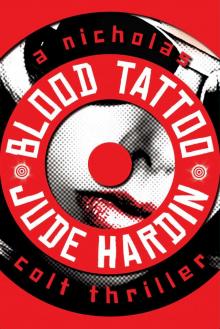 Blood Tattoo (A Nicholas Colt Thriller Book 5)
Blood Tattoo (A Nicholas Colt Thriller Book 5)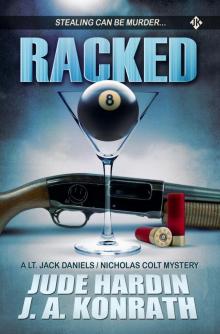 Racked (A Lt. Jack Daniels / Nicholas Colt mystery)
Racked (A Lt. Jack Daniels / Nicholas Colt mystery)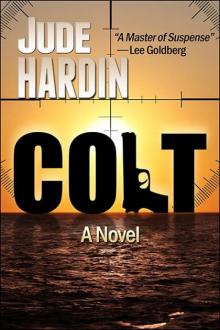 COLT (A Nicholas Colt Thriller)
COLT (A Nicholas Colt Thriller)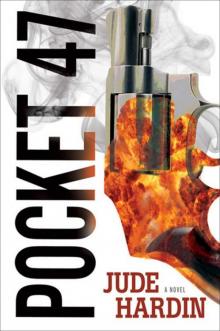 Pocket-47 (A Nicholas Colt Thriller)
Pocket-47 (A Nicholas Colt Thriller)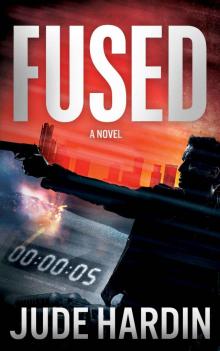 FUSED: iSEAL OMNIBUS EDITION (A Military Technothriller)
FUSED: iSEAL OMNIBUS EDITION (A Military Technothriller) THE JACK REACHER FILES: CHOKE 2 (Episode 2 in the CHOKE Series)
THE JACK REACHER FILES: CHOKE 2 (Episode 2 in the CHOKE Series)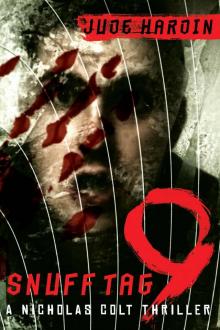 Snuff Tag 9 (A Nicholas Colt Thriller Book 3)
Snuff Tag 9 (A Nicholas Colt Thriller Book 3) THE JACK REACHER FILES: HOSTAGE
THE JACK REACHER FILES: HOSTAGE THE JACK REACHER FILES: THE GIRL FROM THE WRONG SIDE OF CORDIAL (with Bonus Thriller THE BLOOD NOTEBOOKS)
THE JACK REACHER FILES: THE GIRL FROM THE WRONG SIDE OF CORDIAL (with Bonus Thriller THE BLOOD NOTEBOOKS) 3 TERRIFYING THRILLERS
3 TERRIFYING THRILLERS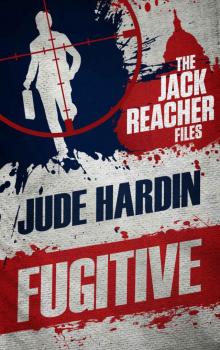 The Jack Reacher Files: Fugitive
The Jack Reacher Files: Fugitive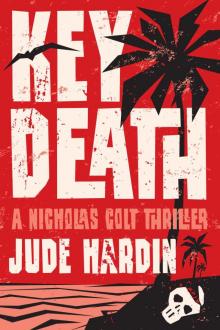 Key Death (A Nicholas Colt Thriller Book 4)
Key Death (A Nicholas Colt Thriller Book 4) SYCAMORE BLUFF (Prequel to THE JACK REACHER FILES: ANNEX 1) (A Nicholas Colt Thriller Book 8)
SYCAMORE BLUFF (Prequel to THE JACK REACHER FILES: ANNEX 1) (A Nicholas Colt Thriller Book 8)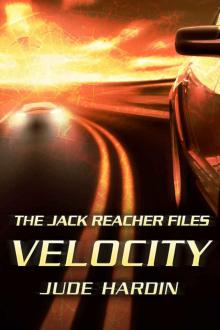 VELOCITY
VELOCITY Fire and Ice
Fire and Ice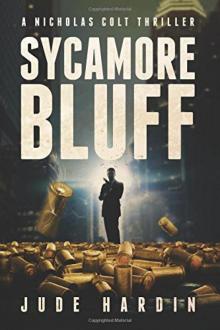 Sycamore Bluff
Sycamore Bluff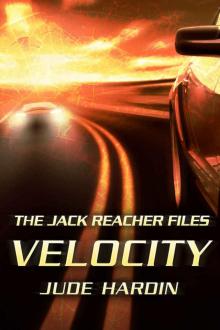 Jack Reacher Files_Velocity
Jack Reacher Files_Velocity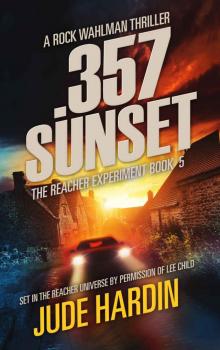 357 Sunset
357 Sunset THE JACK REACHER FILES: CHOKE (Episode 1 in the CHOKE Series)
THE JACK REACHER FILES: CHOKE (Episode 1 in the CHOKE Series)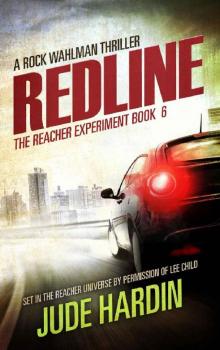 Redline: The Reacher Experiment Book 6 (The Jack Reacher Experiment)
Redline: The Reacher Experiment Book 6 (The Jack Reacher Experiment)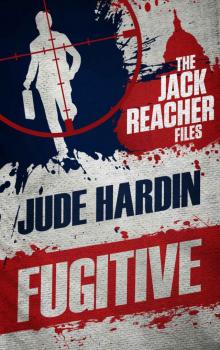 Fugitive
Fugitive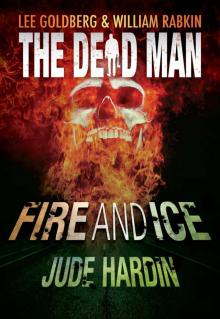 Fire and ice dm-8
Fire and ice dm-8 American PI
American PI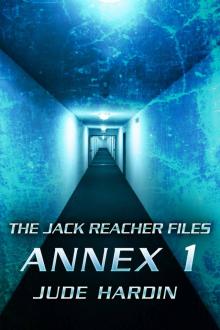 THE JACK REACHER FILES: ANNEX 1 (A Novel of Suspense)
THE JACK REACHER FILES: ANNEX 1 (A Novel of Suspense)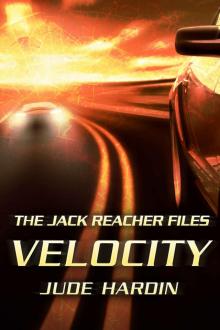 THE JACK REACHER FILES: VELOCITY (with bonus thriller CROSSCUT)
THE JACK REACHER FILES: VELOCITY (with bonus thriller CROSSCUT) The Reacher Experiment
The Reacher Experiment Hostage
Hostage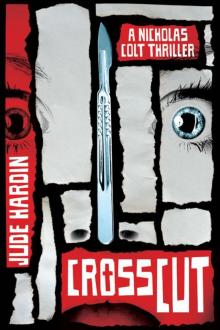 Crosscut (A Nicholas Colt Thriller Book 2)
Crosscut (A Nicholas Colt Thriller Book 2) Lady 52: A Jack Daniels/Nicholas Colt Novel
Lady 52: A Jack Daniels/Nicholas Colt Novel